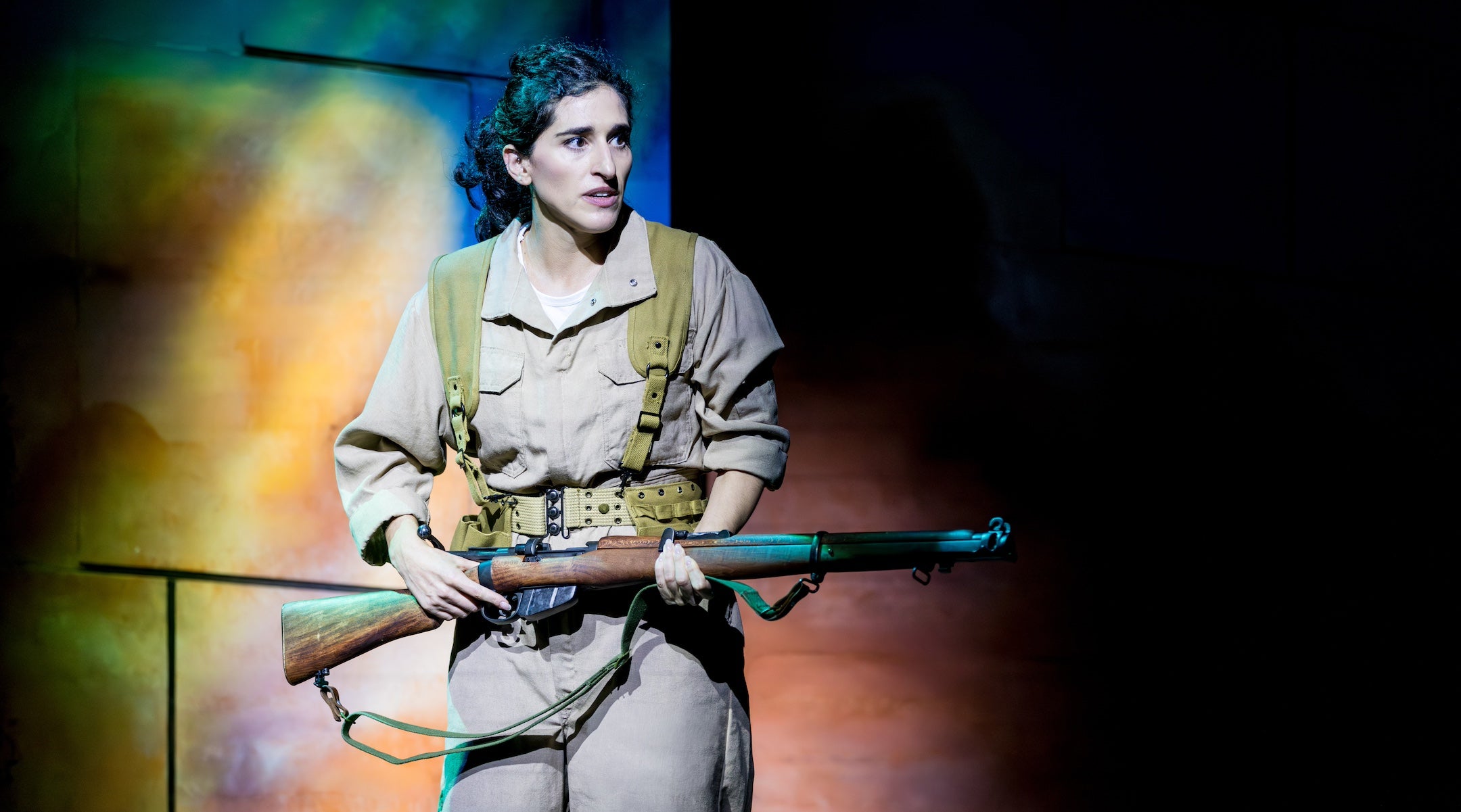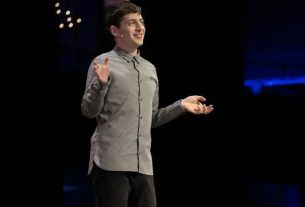More than 80 years after she parachuted into Yugoslavia as part of the only military operation in World War II that attempted to rescue Jews, the Jewish poet and kibbutznik Hannah Senesh is having her moment.
The play “Hannah Senesh” is running through Nov. 9 at the National Yiddish Theatre Folksbiene in New York — an excellent one-woman show, starring Jennifer Apple, that draws directly from Senesh’s diary and poems.
A new book by Douglas Century, “Crash of the Heavens: The Remarkable Story of Hannah Senesh and the Only Military Mission to Rescue Europe’s Jews During World War II,” is a work of nonfiction written with the pacing and tension of a thriller.
Early next year, the noted Israeli journalist Matti Friedman will tell the story of Hannah’s team of parachutists in “Out of The Sky: Heroism and Rebirth in Nazi Europe.”
And this week the New York Times gave Senesh the obituary treatment she had been denied in 1944, as part of its “Overlooked No More” project.
Why, in 2025, is the culture turning its attention to the story of this young poet, soldier and martyr? What does her life mean, especially, to Jews?
Hannah Senesh was born in Budapest in 1921 to an assimilated Hungarian Jewish family. Her father, Béla Szenes, was a well-known playwright and journalist who died when she was a child, and her mother, Katharine, raised her and her brother alone. Their home was cultured and secular.
As a schoolgirl, Hannah excelled in writing and was drawn to literature, but by her teenage years, antisemitism had begun to close in on Hungarian Jews. Rather than retreat, she grew more conscious of her Jewish identity and of the new Zionist movement that sought to combine Jewish pride with action.
In 1939, as the clouds of war gathered, Senesh left Budapest for Palestine. She studied at the Nahalal agricultural school for girls and later joined Kibbutz Sdot Yam near Caesarea, embracing the pioneer life. In the kibbutz she found a community rooted in the land and faith in the future of the Jewish people. There she also honed her poetic voice, writing verses that would later become part of Jewish collective memory.
I, along with countless young people, grew up singing her most famous poem in Jewish summer camps. That is “Eli, Eli” — “My God, my God, may these things never end: the sand and the sea, the rustle of the waters, the lightning of the heavens, the prayer of man.” The poem’s original title is “Walking to Caesarea,” which is where Hannah wrote it. Caesearea, the Roman capital of ancient Palestine, was where the sages suffered martyrdom. The reference to the site suggests Hannah could sense the possibility of her own martyrdom.
So does “Blessed Is the Match,” another of her best-known poems: “Blessed is the match consumed in kindling flame, blessed is the flame that burns in the secret fastness of the heart.”
As the Holocaust unfolded, Senesh could not remain on the sidelines. She volunteered for a special British unit to train Jewish parachutists who would drop behind enemy lines to aid Allied forces and assist persecuted Jews.
Hannah Senesh wears the uniform of the British Women’s Auxiliary Air Force, which she joined in 1943. (Yad Vashem Photo Archive)
In 1944, she parachuted into Yugoslavia as part of an Allied mission to reach occupied Hungary. Her goal was to make contact with the underground and help rescue Jews who were being deported to Auschwitz. After months of operating with Yugoslav partisans, she attempted to cross the Hungarian border but was captured by fascist forces. Tortured, interrogated and offered the chance to save her life by revealing secret details of her mission, she refused. When asked if she was British, she reportedly declared instead, “I am a Jew.”
Senesh was imprisoned in Budapest, tried for treason and executed by firing squad on Nov. 7, 1944. She was only 23. Her writings — diaries, poems, and letters — were preserved by her mother and later published, ensuring that her voice lived on. Nearly every Israeli household has a copy of her writings.
Like Anne Frank, Hannah left behind a diary chronicling her idealism and inner life. But where Anne Frank’s writings reflect a confined adolescence, albeit with a free-floating spirit, Hannah Senesh’s life was defined by agency and action.
She was not only a poet and diarist; she was a soldier who took up arms against the Nazi war machine. Her vision of heroism fused cultural Zionism with physical courage — a model of Jewish strength that is both intellectual and militant. She was, in many ways, a figure closer to Theodor Herzl than to Anne Frank: a Hungarian Jew whose secular upbringing gave way to a conscious and proud Jewish identity, and whose life was devoted to the realization of that identity in the land of Israel.
Like me, Douglas Century grew up learning Hannah’s story. In my conversation with him, he told me that “her martyrdom amazed and terrified” him. He came to know David Senesh, Hannah’s nephew, who is a therapist specializing in trauma (and who this month spoke to the Times of Israel about how his aunt’s story influenced his life and his work with former hostages and other traumatized Israelis). David had been a prisoner of war in the 1973 Yom Kippur War, and spent months undergoing torture. David’s father, George, had been in a POW camp in Vichy France, and his grandmother, Catherine, had been a prisoner of the Gestapo
As David wryly told Century: “I sometimes think it’s our destiny – or something in the Senesh family DNA.”
These converging story lines of Jewish agency and sacrifice suggest why Hannah’s story may be right for these fraught times, marked by antisemitism, anti-Zionism and moral confusion.
The Folksbiene production of Hannah Senesh and the books by Century and Friedman arrive at a time when Jews feel pressure to minimize or conceal their identity. The play’s climactic moment — when Senesh asserts her Jewishness to her captors — feels like a direct message to today’s audience: a call not to erase or apologize for who we are. It is both a historical reenactment and a moral demand.
To that end, the National Yiddish Theatre Folksbiene has launched a special fundraising initiative to make tickets for “Hannah Senesh” available free of charge for students — both Jewish and non-Jewish. With incidents of antisemitism, intolerance and hatred taking place at an alarming clip in the city, NYTF is committed to providing up to 1,000 free student tickets.
There is also a deep cultural hunger for stories of heroism and moral clarity. Senesh’s story even appears in the late Sen. John McCain’s memoir, “Why Courage Matters”: “I don’t think Hannah wanted to die for the sake of having her memory exalted in history or to prove herself equal to a romantic image she conceived for herself,” writes McCain. “Her purpose wasn’t to die. She died for her life’s purpose.”
Senesh’s story is also a rebuke to the way too many Jews and others remember the Holocaust. For decades, much of Holocaust representation has focused on Jewish victimhood and suffering. Senesh represents something different: defiance, action and dignity. Her story restores a narrative of Jewish power and resistance, embodied not by generals or politicians but by a 23-year-old woman who refused to compromise her Jewish identity. In an age when many feel ambivalent about that identity — when assimilation, fear, or politicized hostility challenge Jewish expression — her unwavering sense of purpose feels radical and necessary.
At a time when “Zionist” and its hateful cousin “Zio” are epithets, more often spat than spoken, the musical, in particular, reclaims that identity as a badge of courage. Moreover, it locates a Zionist identity where it belongs — as a symbol of idealism and resilience. In the show, Hannah makes it clear: Her Zionism echoes that of the philosopher Martin Buber, who believed that both Jews and Arabs could and would share the land.
Every time I lead services from the Reform prayer book, “Mishkan T’filah,” and I come to the readings before the Mourner’s Kaddish, I encounter Hannah’s poem, “Yesh Kochavim”: “There are stars up above, so far away we only see their light long, long after the star itself is gone.” That is Hannah Senesh — a star that fell to earth long before its time, but whose light still illuminates the world.
This is Hannah Senesh’s moment. It comes at a time that calls for models of Jewish strength, compassion and integrity. The play and Century’s book answer that call — not with nostalgia but with renewal. They remind us that, even when surrounded by darkness, the match still burns, and the stars still shine.
Keep Jewish Stories in Focus.
(JR) has documented Jewish history in real-time for over a century. Keep our journalism strong by joining us in supporting independent, award-winning reporting.

is the co-founder/co-director of Wisdom Without Walls: an online salon for Jewish ideas. His most recent book is “Inviting God In: A Guide To Jewish Prayer” (CCAR Press).
The views and opinions expressed in this article are those of the author and do not necessarily reflect the views of (JR) or its parent company, 70 Faces Media.




